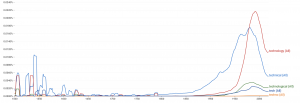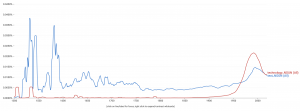- What is your daily need for the items in your bag?
- Most items are directly related to my job or facilitate my ability to do my job the way I like. Others are just-in-case sorts of items. And then there are items that have accumulated and are not needed, which speaks to my personality a bit.
- How might these items be considered “texts” and what do they say about you, the places you inhabit, the cultures with which you engage, and/or the activities you take up?
- The computer symbolizes that I have privilege and financial resources to purchase such a machine, and the fact that I use it for work speaks to the type of teaching I do, with multimedia elements. It’s important to me that I have the computing power and capability to do what I like, rather than being restricted by the technology my workplace might provide. The lack of food or other survival equipment shows that I inhabit a non-wild space.
- Thinking about the title of the course, what are the “text technologies” in your bag, if any? What do these items say about how you engage with language and communication?
- The student work is being marked, and written feedback is in the process of being provided to my students. I communicate to them both the level to which I think they are demonstrated the learning I’ve expected and how they might improve. The business cards have a sociocultural weight to them, and communicate contact information for financial services provided by my wife’s office. She doesn’t work on commission so it’s less about referral business for business’s sake and more about offering people help if I encounter such a situation. The lack of paper based day planner or notebook also says something about how I operate – I rely on technological text based tools and technologies to keep my life and work organized and I embrace those affordances over paper based technology.
- What do the items in your bag say about the literacies you have?
- the computer and adaptor show some digital literacies, and an ability to operate in different spaces with different technologies; I am somewhat of an early adopter but want to remain functional in legacy spaces with my colleagues and the resources available at my workplace. On the surface, the pens imply I’m able to write. At a deeper level, the green pens represent emotional literacy, as in the potential psychological effect on students of work marked in red pen that I’ve been made aware of. I also possess literacies of holding responsibility and conducting myself in my job; the keys give me access to most of the spaces in my workplace (school) but that doesn’t mean I have the right to access or ought to access every space those keys might allow.
- How does the narrative of the (private) contents of your bag compare with the narrative produced by image you have of yourself or the image you outwardly project?
- The fact that I keep my work keys in my work bag while all my other effects like car keys and wallet are kept in a drawer in my house speaks to a strong aspect of my personality in that I am forgetful and keeping work things together is a coping strategy. I outwardly project an organized person, but I have to communicate that this is a developing skill and a coping strategy. I also dress fairly well in brands people might recognize, but people often aren’t aware that most of those clothes were purchased at a deep discount when I was working a retail job before I had full time work teaching. Said another way, I don’t like to spend money but that isn’t how I appear, and my free leather bag is no exception.
- What would this same bag have looked like, say, 15 or 25 years ago?
- In terms of technological advancement, decades ago this bag would contain either a larger laptop computer or no computer at all. Likely more paper (my own teaching materials as well as students). In terms of my own life and development, decades ago this bag would be far less organized and inconsistent day-to-day.
- How do you imagine an archeologist aiming to understand this temporal period might view the contents of your bag many years in the future?
- An amazing question and hard to answer. I don’t know if an archaeologist would be able to predict my job as a high school teacher from the contents of the bag alone. They would be able to place the time period based on the technology of the computer and the dongle. The reusable mask might narrow it down to the 2020 pandemic so long as there aren’t more pandemics to come!!!
Category Archives: ETEC 540 Text
Task 2 (2.3) – Does Language Shape the Way We Think?
Activity 1.4 – Defining Terms
What do the words “text” and “technology” mean to you?
Part 1. What is text? What is technology? How would you define these terms? (initial thoughts without consulting resources).
Text, as I use the term over the last few years, refers to a collection of characters that represent meaning. In my case it is usually Canadian English. In this way, my schema for information or language can be words, actions, thoughts, or text. I tend to add the suffix “book” when referring to a textbook, and find the word text referring to an entire book to be a bit old fashioned or stuffy – something nose-in-the-air academics say. It’s also a buzzword in pedagogy circles, when they refer to “different texts.”
I also use text as a verb meaning to send a message to someone through imessage or mms/sms. It’s quirky, but I don’t refer to WhatsApp or Facebook messages as texts, and definitely not email.
I think of Technology as referring to a tool created by an organism. Nothing created by a natural process counts as a technology, but any thing created by an organism that has a function does, whether it’s a crow using a stick to collect food, or a human made machine that can detect cancer. Additionally, technology usually constitutes an invention that makes some process easier, better, or accomplishes something new. I would consider the ability for ancient humans to produce pigments and create lasting cave art to be technology, but the art itself is not.
I recently listened to Ursula Frankin’s 1989 Massey Lecture on technology, in which she expanded the definition to include processes and systems as well – an individual artisan’s process would not constitute technology, but a formalized systematised process such as one that would be performed on an assembly line or to mass produce something (as opposed to art) constitutes technology. To me, this still fits my definition; even though there is no physical object to point at and call technological, the rote process is a human creation that can be taught and achieves a useful end.
Part 2. Words that might have been updated based on technological advancements.
Drive
Memory
Screen
Web
Phone!
Tab
Window
Cookies
Part 3. Notes from OED Definitions
I find it interesting that my own initial definition was correct, but that my assumption about the older and more recent usage was inverted: text as referring to words is the older and original meaning, while text as short for textbook is newer (1993 addition).
It was fascinating to learn that technology originally meant a treatise on art, but the first excerpt emphasizes that it is particularly human creation as opposed to words attributed to divine origin. Also interesting is that the word technology referred to subject terminology or “technical words” in the 1600s before actually coming to mean mechanical applied science in the 1700s. It makes perfect sense that it evolved in such a way.
Part 4. Ngrams


I can’t help but wonder if a large factor in the early use of “text” is due to errors in OCR and early pre-modern English script. I don’t see any patterns that seem enlightening. The word text has had consistent use while technology was comparatively unused until a recent surge. I tried breaking down different words with “tech” as their root and it was interesting that technical had been in use far earlier, presumably with the rise of industry.
Part 5. Conclusions
I think there’s a poetic beauty to text meaning woven, or the tissue of a literary work. It really paints a picture of the meaning of the words being greater than the sum of the characters that comprises them. Teche as in teaching is related to technology in the sense that technology is a human creation of applied science, and those processes can be conveyed to a learner.